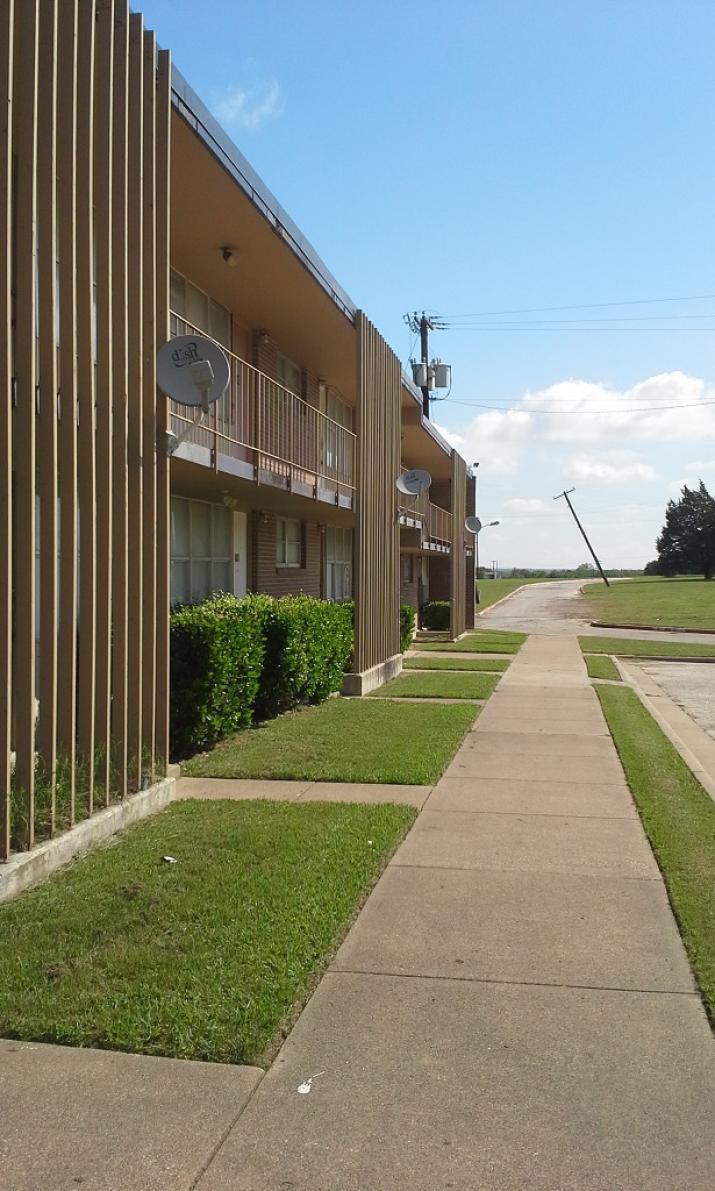
"Memories of the past, hope for the future." This abandoned apartment complex on the Paul Quinn College campus to me reflects the drastic changes that have occurred in the Highland Hills neighborhood. The neighborhood has problems with unused housing, but they do serve as a reminder that the community can thrive once more.
Published June 3, 2014, last updated on April 9, 2018 under Voices of DGHI
By Jake Lennert
My experience in Highland Hills so far so has been an incredible journey of new perspectives and experiences. Right now, we are in the process of “coding” our transcripts of photovoice interviews that we will then analyze to find common themes. In our project, participants took photos relating to environmental health and well-being, and we met with them for interviews where they would explain the meaning of their photos. Monday, we will be presenting our exhibition of photos to the community at the Tommie Allen Rec Center from 6-8pm. Should be a great time, and honestly I was really impressed by the quality of pictures our participants took.
Coming into this project, I had very little….actually zero research experience of any kind. Unlike my pre-med peers who were busy in basic science labs of Duke working on really cool and above-my-head projects, I never was drawn to bench work. Not that I have anything against it, lab research is an incredibly cardinal aspect of Duke and we enjoy the many fruits the valiant researchers who have fixed countless diseases and problems. Yet, I always felt that lab work can feel very distant from humanity at times. From my experiences in a year of organic chemistry and biology lab, I found labs to be a little sterile, unwelcoming, and sometimes boring. And thus, I decided to join this project because I really wanted to experience qualitative research with a premium on cultural and experiential immersion. I can truly say that this project has given me a lot to think about.
I have never experienced life in an impoverished community. It still astounds me that such profound poverty can be located so close to a vibrant and booming metroplex. In speaking to several residents from varying age demographics, several common themes have emerged as problems within the community. Drugs, prostitutes, food access, and education are all issues that grip this community. But I’ve also noticed a very real generational struggle between older generations who have seen the good times of Highland Hills when it was a thriving middle-class community, and the youth who the only Highland Hills they know is one of tough streets and few opportunities. I feel Highland Hills is at a crossroads to decide if it is going to undertake the enormous task of revitalization. What is in the past is done, and I really hope Highland Hills is a completely different place in 10, 20, or 50 years.
Leaving the Duke bubble is always a bit of a surprise to most of us. Gone is the world where everyone comes from incredible academic success and opportunity. Gone is a community where most students have the ability to completely focus on their education. It truly is a bubble; an anomaly of society. And for better or worse, it is why we look at the world, and the world looks at us with a different lens. Not every college has a six billion dollar endowment and an immaculate campus where flowers are replanted every few days in the spring. And so so often, I forget just how much of an outlier Duke, and all most-selective universities, really are. This project has been very impactful in making me realize that my experiences as a Duke student are not applicable to most college students. Paul Quinn College does not have the resources we do, and the manifestations of that reality are profound. I honestly feel like this project killed a naïve part of me that always had this core belief that most people in the United States have a good standard of living. That clearly is false. It’s uncomfortable yet important for me to see the problems of disadvantaged neighborhoods because I believe exposure is the only way to uncover the truth.
So while these four weeks are a qualitative research experience, that’s not why I did it. I’m a member of this project because I want to learn more and experience more of the country that has given me many blessings. I love Duke and its special qualities, but Duke is a place that most people don’t get to experience.
And that is a truth I hope to never forget.

